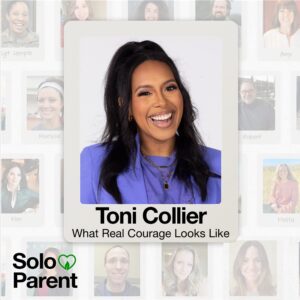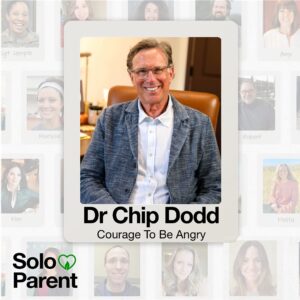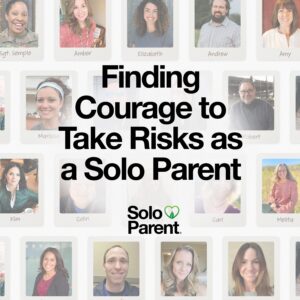There’s a kind of loneliness that creeps in when the house finally quiets. The kids are asleep or at their other parent’s home, the dishes are done, and for the first time all day, you’re alone with your thoughts. Sometimes, instead of rest, that silence becomes unbearable. And without even thinking, you reach for something – your phone, a glass of wine, a late-night project, another episode. Not because it’s meaningful, but because it helps you not feel so much.
As solo parents, we often carry invisible loads. The grief, the anxiety, the sheer mental clutter can become too much. So we look for ways to cope. And some of those ways seem helpful on the outside, working late, staying busy, showing up for everyone else. But over time, even these “healthy” behaviors can become hidden vices that keep us disconnected from ourselves.
This week’s episode features Amber Fuller, a counselor with a Masters in Marriage and Family Therapy (MMFT), who helps unpack the difference between a helpful coping mechanism and a destructive pattern. It’s not always easy to see. Often, we confuse productivity with healing. We confuse distraction with peace. But healing starts when we stop outsourcing our pain and start being honest about what’s underneath.
Here’s why this conversation matters.
Every solo parent will face the temptation to numb. Not because we’re weak, but because the weight is real. And the longer we try to push through it without rest or reflection, the more likely we are to turn to things that feel good in the moment but ultimately cost us connection, with ourselves, with our kids, and with God.
Key Insights from This Episode
- A vice often looks like healthy behavior…until it starts stealing from your life.
- The difference between coping and numbing often lies in how it makes you feel afterward.
- True relief comes not from numbing, but from nurturing.
A vice often looks like healthy behavior…until it starts stealing from your life.
Amber defines a vice as anything we use to escape pain or manage stress that ends up harming us or keeping us stuck. It might be shopping, scrolling, pouring into your job, or even filling every spare moment with “good” activities like volunteering or socializing. “It’s not that those things are bad,” she says, “but if they become a way to avoid what we actually need to feel, that’s when they become destructive.”
Robert shared how his drive to build Solo Parent, while meaningful, started consuming his time to the point where it replaced emotional processing. “It was in the name of something good,” he said, “but I was using it to avoid pain.”
The difference between coping and numbing often lies in how it makes you feel afterward.
Elizabeth explained that she noticed her social media use had crossed a line when she began feeling worse after scrolling, more tired, more disconnected, and full of shame. “It was costing me the things that actually bring joy,” she admitted. Similarly, overthinking during what should have been peaceful moments (like walks) became a mental trap. “It seems productive,” she said, “but really, it’s just spinning.”
Amber added a helpful litmus test: “Is this helping me come back to myself, or disappear from myself?”
True relief comes not from numbing, but from nurturing.
Coping isn’t bad. In fact, it’s necessary. But coping becomes healing when it leads us toward presence, not away from it. Amber encouraged solo parents to get curious about their behaviors and ask: “What do I actually need right now?” That could be rest, stillness, tears, prayer, movement, or simply quiet. “You deserve peace that lasts longer than the episode you just watched,” she said. “Or the drink you just finished.”
Elizabeth shared how somatic practices, like gentle yoga or lying on the floor with a blanket, have helped her reconnect to her emotions in a physical, grounded way. Instead of checking out, she’s learning to check in. “It helps me trust myself again,” she said.
Healing doesn’t always look like big breakthroughs. Sometimes, it’s as simple as choosing nurture over numb, just once, then again, then again.
Listener Question of the Week
Amber shared how even in a busy therapy practice, she made space for herself by closing the blinds, curling up with a blanket, and taking a 25-minute nap. “Not something I would usually do,” she admitted, “but it made all the difference.”
What part of your everyday life feels most overwhelming right now, and how can you find relief?
Elizabeth described being emotionally overwhelmed and learning to sit with her feelings rather than bypass them. “A lot of walks, a lot of tears, and honest conversations with God,” she said.
Robert reflected on the stress of raising adult kids and a chaotic work life. His go-to reset? A 17-minute nap and talking things out loud with someone safe. “Just getting it out of my head helps,” he said.
Stay Connected + Get Support
We want to answer any Solo Parent questions you may have. Submit your listener questions HERE.
Additional Resources:




